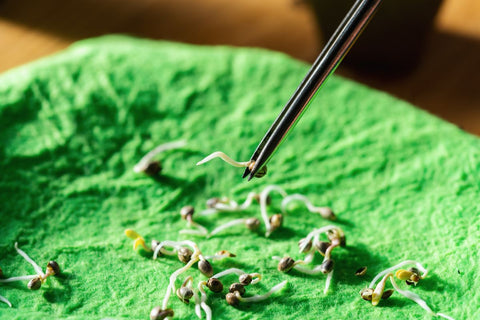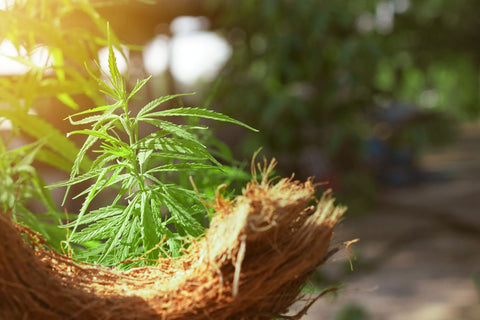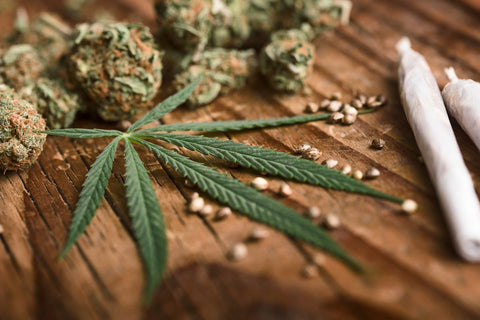Sprouting Success: A Comprehensive Guide on How to Germinate Weed Seeds

Introduction
Germinating weed seeds is a crucial first step in the journey of every cannabis grower. It's the magical process of bringing your seeds to life, setting the stage for a bountiful harvest of those beautiful buds. And hey, you're not alone in your curiosity about this – a quick Google search will show you just how popular this topic is!
The Importance of Germinating Weed Seeds
So, why is germination so important? Well, it's the moment when your seeds wake up and start developing into seedlings. Without this vital step, your seeds won't sprout, and you won't have any plants to nurture. It's the very foundation of a successful growth, and that's why we're diving deep into this topic.
Popularity of the Topic
Just take a look at those Google search results – it's clear that a whole lot of folks are eager to learn about germinating weed seeds. The interest is high, and it's no surprise. After all, this is where it all begins!
Our Goal
In this article, we're on a mission to be your ultimate guide to germinating weed seeds. We'll leave no stone unturned, covering everything from the basics to pro tips. By the time you're done reading, you'll be a germination guru, ready to kick off your growing adventure with confidence. So, sit back, relax, and get ready to soak up all the green-thumb goodness!
Understanding Weed Seeds Germination
Definition of Germination
So, what's germination all about? Well, it's the magical process where a seed awakens from its slumber and starts to sprout. This is when the tiny embryo inside the seed begins to grow and push out a root, then a shoot, and eventually, leaves. It's nature's way of saying, "Let's get this plant party started!"
Factors Influencing Germination
Now, let's talk about what makes those seeds decide it's time to wake up and get growing. There are a bunch of factors at play here, like soil temperature, water potential, exposure to light, fluctuating temperatures, nitrates concentration, soil pH, and the gaseous environment of the soil[1]. These elements can have a big impact on whether your seeds decide to sprout or stay snoozing.
Importance of Proper Germination
Proper germination isn't just a nice-to-have – it's an absolute must for setting the stage for a successful growth. The right conditions during germination can make all the difference in whether your seeds sprout into healthy, robust plants. Factors like temperature, moisture, light, and soil quality can significantly influence the germination and emergence of weed seeds. Getting this step right paves the way for strong, vibrant plants that are ready to thrive.
Step-by-Step Guide to Germinating Weed Seeds

Germinating weed seeds can be a bit of a tricky process, but with the right approach, you can set yourself up for success. Here's a step-by-step guide to help you get those seeds sprouting in no time!
Selecting High-Quality Seeds
The first step to successful germination is selecting high-quality seeds. Look for seeds that are plump, firm, and have a dark color. Avoid seeds that are cracked, damaged, or have a light color. You can purchase seeds from reputable seed banks or breeders, or you can try your hand at collecting seeds from your own plants.
Choosing the Right Germination Method
There are several methods for germinating weed seeds, including the paper towel method, water glass method, soil method, and more. Each method has its pros and cons, so it's important to choose the one that works best for you. For example, the paper towel method is a popular choice because it's simple and effective. You just need to place your seeds on a moist paper towel, fold it over, and place it in a plastic bag. The water glass method involves placing your seeds in a glass of water and waiting for them to sink to the bottom, indicating that they're ready to sprout.
Providing Optimal Conditions
Once you've chosen your germination method, it's time to provide your seeds with the optimal conditions for sprouting. This includes maintaining a temperature range of 70-85°F, keeping the seeds moist but not waterlogged, and providing adequate light. You can use a seedling heat mat to maintain a consistent temperature and a humidity dome to keep the seeds moist. Be sure to monitor your seeds daily and adjust the conditions as needed.
Monitoring and Troubleshooting Common Issues
Germinating weed seeds can be a bit finicky, and there are several common issues that can arise. For example, if your seeds aren't sprouting, it could be due to poor quality seeds, incorrect temperature or humidity, or other factors. If your seeds have sprouted but aren't growing, it could be due to insufficient light or nutrients. Be sure to monitor your seeds closely and troubleshoot any issues that arise.
By following these steps, you'll be well on your way to successful germination and a bountiful harvest of those beautiful buds!
In-Depth Analysis of Top 3 Search Results

1. The Green Thumb Guru's Wisdom
First up is the Green Thumb Guru, a renowned authority in the cannabis cultivation realm. Their insights are like the gold standard of germination guidance. According to the Guru, the key lies in selecting seeds wisely. They emphasize the importance of acquiring seeds from reputable sources, ensuring genetic integrity and optimal germination potential.
Moreover, the Guru advocates for a personalized approach. Different strains may have unique germination preferences. Dive into their recommendations for specific strains, unraveling the mysteries behind each seed's journey to sprouting glory. It's like a matchmaking service but for seeds and soil.
2. The Maverick's Maverick Method
Our second contender, known as The Maverick, brings a wild, unconventional flair to the table. According to The Maverick, germination is an art, not a science. They throw the rulebook out the window and encourage experimentation.
One standout technique suggested by The Maverick involves a musical serenade for your seeds. Yes, you read that right! The gentle hum of a specific playlist is believed to create a harmonious environment for seeds to awaken. Unorthodox? Absolutely. Intriguing? Without a doubt.
3. The Science Geek's Laboratory Insights
Last but not least, we delve into the realm of the Science Geek's Laboratory. These meticulous researchers bring a methodical, scientific approach to the germination game. Temperature, humidity, light cycles – no stone is left unturned.
The Science Geek reveals the optimal environmental conditions for germination success. Get ready to geek out on the precise temperature ranges, humidity levels, and light intensities that can make or break your seedling's debut. It's like turning your growing space into a carefully calibrated greenhouse, ensuring your seeds feel like botanical royalty.
Unveiling the Common Thread
While these experts may seem worlds apart in their approaches, there's a common thread weaving through their advice: attention to detail. Whether it's genetic scrutiny, musical accompaniments, or scientific precision, the key is to be in tune with your seeds' needs.
Importance of Seed Quality
The Importance of Seed Quality
Seed quality plays a crucial role in the success of germination and the overall health of crops. It directly impacts the genetic and physical purity of the crops, the desired plant population, and the capacity to withstand adverse conditions. Here, we will explore the significance of seed quality and provide tips for identifying and obtaining high-quality seeds.
Impact on Germination Success
High-quality seeds are essential for achieving a robust and high-quality crop output. They possess characteristics such as genetic purity, physical quality, physiological quality, and seed health. Good quality seeds ensure high and even germination rates, uniform growth, and the absence of fungal or insect infestations. Poor quality seeds may lead to slow germination, poor crop stands, and weak seedlings, ultimately affecting the overall value of crop yield and crop health.
Tips for Identifying and Obtaining High-Quality Seeds
1. Genetic Purity: Look for seeds that are true to their type and free from impurities or contaminants. Purchasing seeds from reputable and certified sources can help ensure genetic purity.
2. Physical Quality: Consider the seed's dimensions, weight, color, and texture. High-quality seeds are uniform in appearance and free from debris, dead or broken seeds, and other crop or weed seeds.
3. Physiological Quality: Assess the seed's ability to germinate, survive, and produce healthy seedlings. Choose seeds with high and even germination rates to maximize the chances of a successful crop.
4. Seed Health: Ensure that the seeds are free from seed-borne pests and diseases. Seed testing laboratories play a vital role in assuring seed quality by conducting tests to determine the presence of any quality issues in seeds before plantation.
By understanding the impact of seed quality on crop production and following these tips, farmers can increase their yield and protect their crops from various ailments. Investing in high-quality seeds is a fundamental step towards achieving satisfactory crop production.
Tips for Germinating Specific Weed Strains
Tips for Germinating Specific Weed Strains
When it comes to germinating specific weed strains, it's important to consider the unique characteristics and requirements of each strain. Here, we will discuss strain-specific considerations for successful germination and highlight the differences and nuances among various strains.
Cannabis Seeds Germination
Germinating cannabis seeds is the first step in growing your own cannabis plants. It requires attention to detail and a bit of patience. Providing the optimal conditions of moisture, darkness, and a suitable growing medium sets the stage for your seeds to transform into healthy seedlings.
Strain-Specific Considerations
Each cannabis strain may have its own unique germination requirements. Factors such as seed size, shell hardness, and preferred germination method can vary between strains. For example, some strains may benefit from pre-soaking the seeds, while others may prefer direct planting into the growing medium. It's important to research the specific germination guidelines for the particular strain you are working with to maximize the success of the germination process.
Germination Methods
There are several methods for germinating cannabis seeds, including the paper towel method, direct soil germination, and rockwool germination. Each method has its own advantages and considerations, and the best method may vary depending on the specific strain being germinated. For example, the paper towel method provides a clear view of germination progress and can be effective for stubborn weed seeds, while rockwool germination creates a mini tropical climate for the seeds.
Choosing the Right Cannabis Seeds
When germinating specific weed strains, it's important to choose high-quality cannabis seeds from reputable sources. Consider factors such as strain type (Sativa, Indica, or Hybrid), desired effects, and growth characteristics. Opting for reputable sources and quality materials increases the chances of successful germination and, ultimately, a successful growth.
By understanding the strain-specific considerations for germination and following the appropriate methods, growers can set the stage for a successful and rewarding cannabis cultivation experience. Each strain has its own unique qualities, and by tailoring the germination process to these specific traits, growers can maximize their chances of a successful and bountiful harvest.
Troubleshooting Common Issues

Troubleshooting Common Issues
Germinating weed seeds can be a challenging process, and even experienced growers can encounter problems. Here, we will address potential problems during germination and provide solutions and preventive measures.
Overwatering or Underwatering
Overwatering or underwatering can be a common issue during germination. Overwatering can lead to root rot and other fungal diseases, while underwatering can cause the seeds to dry out and die. To prevent these issues, it's important to check the soil moisture regularly and water the seeds only when necessary. A good rule of thumb is to keep the soil moist but not soaking wet.
Nutrient Deficiencies
Nutrient deficiencies can also be a problem during germination. Nitrogen deficiency can cause yellowing of leaves, while potassium deficiency can lead to stunted growth. To prevent nutrient deficiencies, it's important to use high-quality soil or growing medium and provide the appropriate nutrients for the specific strain being germinated.
Excessive Heat or Light
Excessive heat or light can also be a problem during germination. Too much heat can dry out the soil and damage the seeds, while too much light can cause the seeds to dry out and die. To prevent these issues, it's important to provide the appropriate temperature and light conditions for the specific strain being germinated. A good rule of thumb is to keep the temperature between 70-85°F and provide 18-24 hours of light per day.
Seed Shell Stuck on Seedling
Sometimes, the seed shell can get stuck on the seedling, preventing it from growing properly. To fix this issue, gently remove the seed shell using tweezers or your fingers. Be careful not to damage the seedling in the process.
Choosing the Right Seeds
Choosing the right seeds is also important for successful germination. Opt for high-quality seeds from reputable sources and consider factors such as strain type, desired effects, and growth characteristics. By choosing the right seeds, growers can increase their chances of successful germination and ultimately, a successful grow.
Conclusion
The germination process is a critical first step in the journey of growing healthy and robust cannabis plants. Throughout this guide, we've explored the importance of seed quality, strain-specific germination tips, common issues, and valuable external resources. By prioritizing high-quality seeds, understanding strain-specific considerations, and addressing common germination issues, growers can set the stage for a successful and rewarding cultivation experience.
Embracing Experimentation
As you embark on your germination journey, don't be afraid to experiment with different germination methods and techniques. Each strain and growing environment is unique, so finding the optimal approach may require some trial and error. By embracing experimentation, you can discover the methods that yield the best results for your specific growing conditions and preferences.
Happy Growing!
We encourage you to approach the germination process with curiosity and a willingness to learn. Whether you're a novice grower or an experienced cultivator, the journey of germinating cannabis seeds is filled with opportunities for discovery and growth. Happy growing, and may your germination efforts yield a bountiful and thriving cannabis garden!





